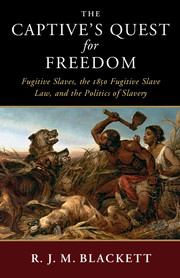 The Captive's Quest for Freedom
The Captive's Quest for Freedom Published online by Cambridge University Press: 19 January 2018
There would have been no need for a fugitive slave law, either in 1793 or 1850, had slaves not escaped regularly, and in such numbers, that their activities came to be seen as a threat to the survival of the slave system. Taking as its point of departure the passage of the 1850 Fugitive Slave Law, this study focuses on the many ways the enslaved, by fleeing their enslavement, raised questions both about the law's legitimacy and the economic and political system it was meant to protect. As a Cleveland editor put it on the eve of the Civil War, in struggling for their freedom, slaves, by their actions, were responsible for starting “an ‘underground railroad’ system of escape” that, over the years, had amassed an impressive record of success, even if it had not totally undermined the system of slavery. Their actions were sustained by informal networks and alliances in slaveholding communities, by abolitionists who opposed the law, by those who had no particular aversion to the law but who were dragged nonetheless into the political maelstrom caused by efforts to reclaim fugitives from slavery in free states, and by the concerted efforts of black communities, large and small, urban and rural, that openly defied the implementation of the law. If it is true that laws can only gain their legitimacy by being assented to by all they wish to bind, then the 1850 Fugitive Slave Law was doomed to failure from its very inception. It met with strong opposition in and out of Congress for its violations of bedrock principles of jurisprudence and for its pandering to slave interests, which had been clamoring, for some time, for a more effective law to facilitate the recapture of escaped slaves, or, as the Constitution denominated them, “fugitives from labor.” Slaveholding interests unabashedly declared that on its passage and enforcement rested the future of the Union. Many observers were convinced, however, that nowhere in the Constitution was Congress expressly granted the power to enact such a law. Yet advocates thought it did and their position carried the day. The result was a law that nationalized the recapture of fugitive slaves. Consequently, every effort to retake an escapee had the potential to create deep political crises in the communities in which it occurred.
To save this book to your Kindle, first ensure [email protected] is added to your Approved Personal Document E-mail List under your Personal Document Settings on the Manage Your Content and Devices page of your Amazon account. Then enter the ‘name’ part of your Kindle email address below. Find out more about saving to your Kindle.
Note you can select to save to either the @free.kindle.com or @kindle.com variations. ‘@free.kindle.com’ emails are free but can only be saved to your device when it is connected to wi-fi. ‘@kindle.com’ emails can be delivered even when you are not connected to wi-fi, but note that service fees apply.
Find out more about the Kindle Personal Document Service.
To save content items to your account, please confirm that you agree to abide by our usage policies. If this is the first time you use this feature, you will be asked to authorise Cambridge Core to connect with your account. Find out more about saving content to Dropbox.
To save content items to your account, please confirm that you agree to abide by our usage policies. If this is the first time you use this feature, you will be asked to authorise Cambridge Core to connect with your account. Find out more about saving content to Google Drive.